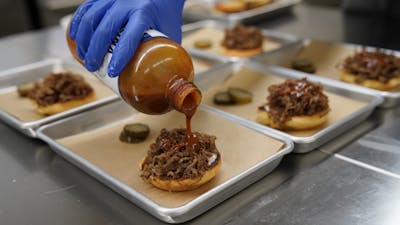- Sustainable food production

Meat Alternative from Vegetable Protein
Wyss and Harvard researchers spin “muscle” fibers from vegetable plant proteins, launching alternative meat startup
Tender Food is commercializing a Wyss nanofiber-spinning technology to produce alternative meats whose texture is more like the real thing.
The Problem
Nearly 60% of global greenhouse gas emissions are linked to the production and processing of meat, according to a 2021 study published in Nature Food. And with a growing world population that increasingly wants to and can afford to eat more meat, that number is expected to increase. Alternatives to conventionally produced meat are sorely needed to avoid exacerbating the already significant environmental toll that meat production is taking on our planet. While plant-based foods that imitate meat are now on the market with claims to mimic the flavor and juiciness of meat, they fail to fully replicate the texture and complexity of whole-muscle cuts such as pulled pork, chicken breast, and steak.
Our Solution

Researchers at the Wyss Institute and Harvard’s John A. Paulson School of Engineering and Applied Sciences (SEAS) have adapted rotary jet-spinning technology to spin muscle fiber out of vegetable proteins, simulating the texture of steak or pulled pork without using any animal products.
Product Journey
Kit Parker, Ph.D., an Associate Faculty member of the Wyss Institute and the Tarr Family Professor of Bioengineering and Applied Physics at SEAS, is also a Colonel in the United States Army Reserve and has served two combat tours in Afghanistan. His exposure to combat casualties and their care sparked his scientific interest in engineering new technologies to help repair and regenerate the body after injury. Among many projects in his lab, Parker and several members of his group developed rotary jet-spinning technology, in which a liquid polymer solution is loaded into a reservoir, then ejected through a small opening by centrifugal force. As the device spins, the polymers elongate into fibers, similar to how a cotton candy machine spins melted sugar into a wispy, cloud-like texture.
A grant from the providing Parker’s lab with significant funding and business development resources from both the Wyss and OTD. In one major success, the improved technology was able to spin proteins into synthetic heart valves.
But Parker and his team were also experimenting with making nanofibers out of natural materials, from lemongrass to soy to alfalfa. The lab’s interest in alternative meat grew alongside that biomedical work, and postdoctoral researcher Luke MacQueen led a project at SEAS to explore what else could be spun out of microfibers.
Parker’s lab soon showed they could spin gelatin scaffolds to hold animal muscle cells, creating lab-grown meat. Their results were published in the journal Science of Food in 2019. Parker realized that the fibers were more important than just an organizational method for producing food – their texture is actually very important to contributing to an eater’s perception that they’re eating meat. He wanted to go further and spin fully animal-free lab-grown meat that actually replicated the mouthfeel of animal protein.
He found the perfect partner in Christophe Chantre, Ph.D, who was then pursuing a master’s degree in mechanical engineering at the Swiss Federal Institute of Technology Zürich but had become increasingly interested in the intersection of biology and biomedical engineering with climate and sustainability. Developing alternative, plant-based meats turned out to be exactly the kind of work Chantre was looking for, and he joined Parker’s Disease Biophysics Group as a Research Associate.
In June 2020, Chantre, Parker, Grant Gonzalez, Ph.D. and MacQueen, also from Parker’s lab, co-founded Tender Food to bring their animal-free meat to the masses.
Impact
In 2022, the Somerville-based startup Tender Food announced that they had secured $12 million in seed financing led by Lowercarbon Capital.
Tender’s founders say their products will differ from other alternative meat in texture and mouthfeel, as the core innovations licensed from Harvard enable the company to simulate the complexity of whole-muscle cuts such as pulled pork, chicken breast and steak. Tender launched its first product in 2022, which is now being served at Saus, a vegetarian restaurant in Somerville’s Bow Market. In 2024, Tender secured a contract with Clover Food Lab, a vegetarian fast-food chain in the Boston area. Tender Food is now served at a dozen locations, including Wusong Tiki Bar in Harvard Square.
Tender got a big vote of confidence when Parker, who is also a Kansas City Barbeque Society certified judge, finally tried the company’s pulled pork product – and said it tasted good. If other meat-eaters agree that the taste and texture are right, the company hopes consumers will come back for second helpings.